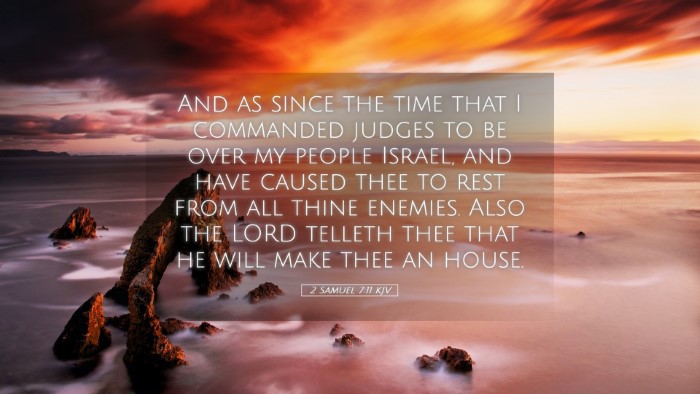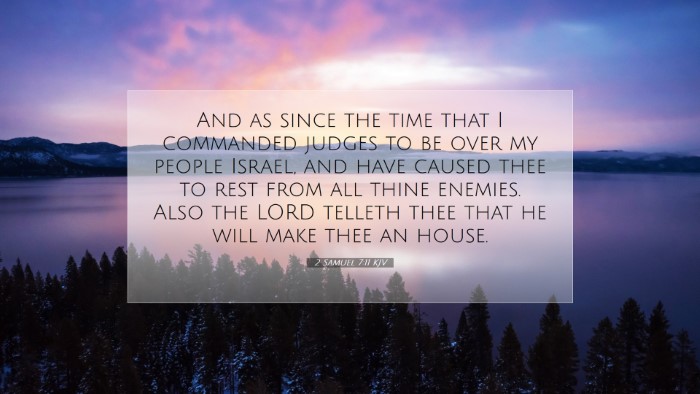Commentary on 2 Samuel 7:11
Verse in Context: 2 Samuel 7:11 reads, "And as since the time that I commanded judges to be over my people Israel, and have caused thee to rest from all thine enemies. Also the Lord telleth thee that he will make thee an house."
Introduction
This verse is a part of God's covenant with David, affirming His promise of a dynasty. It holds significant theological implications regarding God's faithfulness, the Davidic covenant, and the anticipation of the Messianic age.
Theological Significance
Covenant Theology: The promise made to David establishes a central theme in biblical theology—the Davidic Covenant, which signifies God's commitment to establish David's lineage. This covenant highlights God's sovereignty and His choice to create a people for Himself through David's descendants.
- God's Initiative: This verse emphasizes that God acts according to His will. The phrase "the Lord telleth thee" demonstrates that it is God who chooses to reveal His plans to humanity.
- Rest from Enemies: David's rest from his enemies signifies God's protection and favor. This rest is not merely physical but reflects spiritual tranquility and divine assurance of leadership.
Insights from Public Domain Commentaries
Matthew Henry's Commentary
Promise of an Everlasting Kingdom: Matthew Henry notes that God’s pledge to David signals the establishment of an everlasting kingdom. David's desire to build a temple for the Lord was noble; however, the Lord redirects him to focus on the greater plan of a royal lineage, culminating in Christ, the ultimate King.
Albert Barnes' Notes on the Bible
Restoration and Assurance: Barnes highlights that the "rest" provided to David was in stark contrast to the turbulent reigns of previous leaders. This period allowed for divine worship and the establishment of Israel's identity. God's commitment to make David a “house” relates not just to a physical building but symbolizes a lasting dynasty, shaping the future of Israel.
Adam Clarke's Commentary
Implications of 'Building a House': Adam Clarke elaborates on the metaphor of God building a house for David. This house is both a literal reference to the temple to be built by Solomon and a metaphor for the eternal lineage leading to Jesus Christ. Clarke emphasizes the grace involved in God choosing David and affirms the importance of faithful leadership.
Exegetical Considerations
Historical Context: Understanding the historical backdrop of 2 Samuel is critical in interpreting this verse. David, having faced numerous military challenges, is now at a point where enemies are subdued. The proclamation of rest signifies a culmination of divine faithfulness towards Israel.
Literary Structure: The passage serves as a narrative pivot, moving from David's personal desires to God’s divine intentions. The shift from a desire to build a temple to God's promise reinforces the notion that divine purposes far exceed human plans.
Application and Reflection
For Pastors and Preachers: This passage encourages leaders to seek understanding of God’s broader narrative rather than just pursuing personal ambitions. It serves as a reminder that God can work through us in ways we may not fully comprehend.
For Scholars and Theologians: The examination of 2 Samuel 7:11 invites a deeper exploration of covenants in Scripture. The unfolding importance of the Davidic line invites discussion of its implications for eschatology and the fulfillment of God's promises through Christ.
Conclusion
The promise made to David in 2 Samuel 7:11 is far more than an ancient covenant; it is an essential thread in the tapestry of Scripture that points towards the fulfillment found in Jesus Christ. Understanding this passage allows believers to appreciate the faithful nature of God and the unfolding drama of redemption through history.


